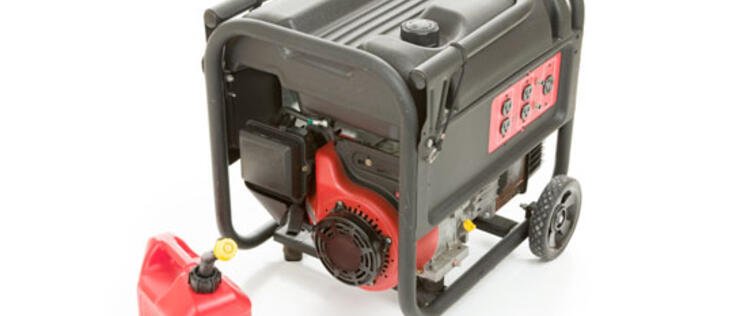Generators are a handy addition for any home or outdoor project. But they can also be very dangerous if they aren't used properly. Some of those dangers are:
- Carbon monoxide
- Electric shock and electrocution
- Overheating and fires
ALWAYS follow all manufacturers' instructions and contact a qualified electrician or electrical inspector if you have questions.
Where there's exhaust, there's carbon monoxide (CO), a colourless and odourless gas found in engine exhaust.
- Keep your portable generator outdoors. Garages, or even partially enclosed areas, can trap CO gases and put you at risk of deadly vapours
- Keep the generator away from windows and doors that lead into a house or building. Even if your generator is outside, exhaust can still enter through vents, windows, and doors
- Dizzy, nauseous, headachy, or fatigued? These are symptoms of being exposed to CO. Seek medical attention immediately. Get a battery operated CO detector. They'll pick up on any CO leaks inside your home or building, and warn you before any serious exposure
NEVER connect a generator to an existing house wiring system.
- The right way to connect a portable or stationary generator to your home's wiring system requires a specific transfer switch
- Transfer switches must be CSA approved
- An electrical permit is required to install the transfer switch and generator
- The installation must be approved by an electrical inspector
- Contact NTPC for information about electrical contractors or an inspector in your area
NEVER plug a portable generator directly into a regular household electrical outlet.
- If you use your generator this way you may cause feedback which can trip your fuses, or cause a fire if you don't have the proper grounding
- Feedback is a serious electrical danger to your appliances, your home, and to utility workers
 ALWAYS plug appliances directly into the generator.
ALWAYS plug appliances directly into the generator.
- Or, use a CSA-approved, 3-pronged outdoor extension cord that is in good condition. The cord must be of the proper gauge to handle the current load
- Use a Ground Fault Circuit Interrupter (GFCI) portable extension cord if using a portable generator to power electrical tools for outdoor use
- Don't overload the generator. Do not exceed the maximum number of plugs listed for your generator. Look at the Wattage load of the appliance to ensure the generator is not overloaded
- Turn the generator off to fill with fuel and do not overfill. Let the generator cool down before fueling to prevent fire
- Have a low temperature rated fire extinguisher ready near the generator

